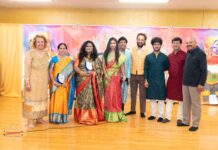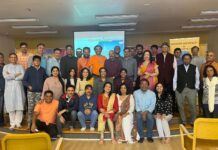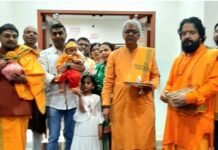PALO ALTO, CA : An evening that was promised to be an ex-perience of folk and Sufi music with a contemporary flavor started off with a whimper at the Cubberly Theater, as the relatively new home grown band, Easter Brew began their act. The technical difficulties of the loud guitars, which all but drowned out the lyrics, the discordant assembly of the vocalists, guitarists, drums, keyboard and violin appeared doomed. The acoustics of the small theater seemed ill suited to support a musical soiree.
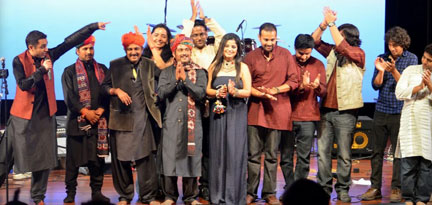 The highlight of the first number, Lazarus + Dur was the haunting violin manned by the ever smiling free lancer, Radhika Iyer, who remained unfazed, and in a subsequent number, Sadhe Ro, delivered a memorable jugalbandi with the vocalists.
The highlight of the first number, Lazarus + Dur was the haunting violin manned by the ever smiling free lancer, Radhika Iyer, who remained unfazed, and in a subsequent number, Sadhe Ro, delivered a memorable jugalbandi with the vocalists.
Loud inputs from audience members prompted some tweaking in the modulations of on stage sounds and brought some relief from the technical difficulties. The much awaited Barmer Boys who have traveled from Rajasthan, India, played alongside the Eastern Brew crew in a number labeled Alla Hoo, which represented a devotional Sufi offering praising the Almighty. The Barmer Boys were a three person group, with a dholak, Mangey Khan, the vocalist on the harmonium, and the lively Rais Khan playing the Kartaal.
As the up tempo number kicked off , the vocal power house of Ishmeet Narula and Mangey Khan blended jubilantly and set the audience tapping their feet, forgetting about the earlier woes of technical setbacks.
The first half of the show ended on a high note with a popular song, “Jugni”, which has also made it to the Indian cinema, and had the audience clapping the whole way. At that point, the audience was assured that the new show, “In search of Mirage” presented by Mausaki, has arrived, and will deliver on its promise of a unique, entertaining musical evening.
Pure magic of music
The founder of Mausaki, Shekhar Hemnani expounded on his mission to bring excellence in all forms of music to the appreciative and savvy Bay Area audience, and provide a sorely needed pause in the chaos of our lives to immerse in the pure magic of music. He further explained the choice of the title of the show, which seemed a misconception at first, as common knowledge would have us think that oasis is what is sought, not the mirage.
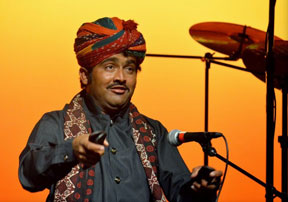 However, even as our dreams and wishes get fulfilled, we continue seeking other dreams and wishes, just as seeking a mirage beyond the oasis. Likewise, the Sufi saints continue to seek the Holy mirage, even after finding God.
However, even as our dreams and wishes get fulfilled, we continue seeking other dreams and wishes, just as seeking a mirage beyond the oasis. Likewise, the Sufi saints continue to seek the Holy mirage, even after finding God.
Mausaki is supported by partners such as AID (Association for India’s Development), Asha for Education, South Asian Arts at Stanford and RANA (Rajasthani Association of North America) in this venture. This effort was also, in large part, a contribution of Ankur Malhotra, founder of AmarRaas Records, who has tasked himself with recording music from all over the Indian continent, and to bring forth the hidden and hugely talented local artists rendering folk music.
Ankur and his team chanced upon the music of Mangey Khan during a recording session with another musician in Rajasthan, and when Mangey Khan sang for them, they described feeling goosebumps, and determined to introduce him to the world. This team has kept its promise as the Barmer Boys embark on their maiden international journey, ending up as openers for Rolling Stones in Denmark in June. It does take a village to bring the villagers to the cities in the world stage!
In a conversation, Ishmeet Narula, the female lead of Eastern Brew, explained how the musicians are diverse in their training and background. While she has a strong base in folk music, and renders the Sufi elements with great perfection, her band mates are trained in Indian classical, and western music. Together their blend represents a unique meld of genres and nuances that are an absolute delight to the senses. She further elaborated that she includes original verses in the midst of the songs they sing that are someone else’s composition, and enhances their interpretations.
The highlight of the post intermission segment was the Barmer Boys getting center stage and the opportunity to impress with their captivating repertoire. The Barmer Boys belong to the Manganiyar people, and residents of a small town in Rajasthan, Barmer, where music is in their blood, and generations pass down the oral tradition of life in the Thar Desert. Several of their compositions are praises of various Sufi saints, while some celebrate life lessons.
On stage, the musicians began this journey with a tribute to Pir Murshid, the patron saint of the Manganiyars, seeking his blessings. Rais Khan enthralled the audience with his accompanying instrument, the “morchang”, which is a mouth instrument much like whistling through a reed. He then transitioned to a “bhapang”, played like a one stringed ukulele.
Several more compositions including a love story, a number memorializing the reign of Raja Raichand, and a sweet, light hearted banter celebrating the mischievous and endearing bond between a “Jeeja-saali” (sister and brother in law) followed.
The audience was thoroughly captivated and delighted with the singing prowess of Mangey Khan, the antics of Rais Khan, and the synergy of the trio.
The remainder of the performance was a complete fusion between the East and West bands unified by the common Sufi and folk themes. A particularly memorable “Chhoti si umar + O Chiriya” related the poignant tale of a young girl’s plea to her father, begging him not to get her married at her tender age, and asking what did she do wrong to deserve this. Radhika rose to the occasion once again and her violin strings emoted the young girl’s plight.
Rais Khan entertained in the next few numbers with his beat boxing and kartal, while the guitars and violin came together in yet another form of jugalbandi. The guitar renditions subsequently, in a number, “Pir Jalani” which sings the praises of the founder of the Sufi Quadr added a more contemporary flair to the arrangement, while the morchang was the soul of the folk.
The grand finale was the peppy “Dum a Dum Mast Kalander” number, which is already very familiar to all music lovers, and sung by the likes of Runa Laila in years past, and is a prayer to Jhulelal, the Lord of Sindh. The variations in this arrangement by the vocalists, percussionists and bass guitar, along with audience participation rocked the house in a foot stomping blast of symphony.
It was a treat for the senses to be presented with the acoustics of the guitar, violin, keyboard, the percussions of the drums and dholak, and the spellbinding vocals of Ishmeet and Mangey in a final rapturous crescendo. It left no doubt in anyone’s mind that folk and Sufi music can hold a candle on their own. And indeed provide the pause, a moment, of reflection and enjoyment in the sheer beauty of music which speaks from the heart, and touches the soul.
Archana Asthana
India Post News Service


